定语从句先行词特殊用法
- 格式:doc
- 大小:29.00 KB
- 文档页数:2
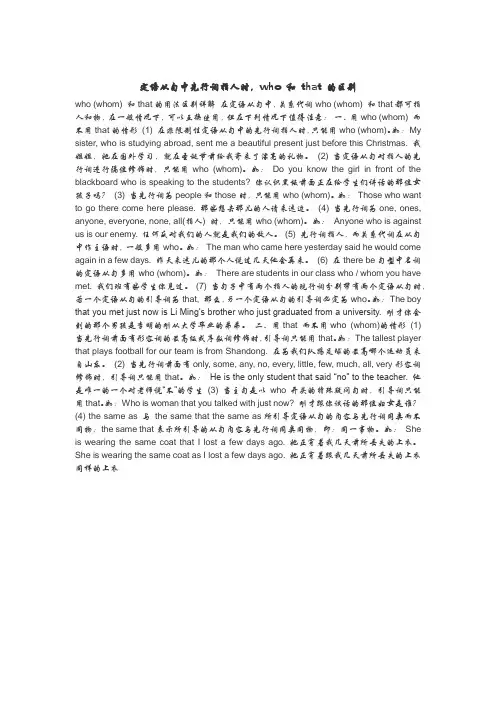
定语从句中先行词指人时,who 和that 的区别who (whom) 和that的用法区别详解在定语从句中,关系代词who (whom) 和that都可指人和物,在一般情况下,可以互换使用,但在下列情况下值得注意:一、用who (whom) 而不用that的情形(1) 在非限制性定语从句中的先行词指人时,只能用who (whom)。
如:My sister, who is studying abroad, sent me a beautiful present just before this Christmas. 我姐姐,她在国外学习,就在圣诞节前给我寄来了漂亮的礼物。
(2) 当定语从句对指人的先行词进行隔位修饰时,只能用who (whom)。
如:Do you know the girl in front of the blackboard who is speaking to the students? 你认识黑板前面正在给学生们讲话的那位女孩子吗?(3) 当先行词为people和those时,只能用who (whom)。
如:Those who want to go there come here please. 那些想去那儿的人请来这边。
(4) 当先行词为one, ones, anyone, everyone, none, all(指人) 时,只能用who (whom)。
如:Anyone who is against us is our enemy. 任何反对我们的人就是我们的敌人。
(5) 先行词指人,而关系代词在从句中作主语时,一般多用who。
如:The man who came here yesterday said he would come again in a few days. 昨天来这儿的那个人说过几天他会再来。
(6) 在there be句型中名词的定语从句多用who (whom)。
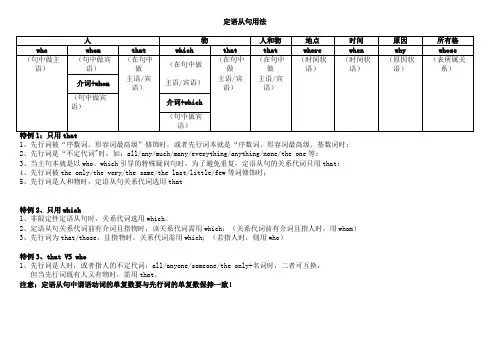
定语从句用法
1、先行词被“序数词、形容词最高级”修饰时,或者先行词本就是“序数词、形容词最高级、基数词时;
2、先行词是“不定代词"时,如:all/any/much/many/everything/anything/none/the one等;
3、当主句本就是以who、which引导的特殊疑问句时,为了避免重复,定语从句的关系代词只用that;
4、先行词被the only/the very/the same/the last/little/few等词修饰时;
5、先行词是人和物时,定语从句关系代词选用that
特例2、只用which
1、非限定性定语从句时,关系代词选用which。
2、定语从句关系代词前有介词且指物时,该关系代词需用which;(关系代词前有介词且指人时,用whom)
3、先行词为that/those,且指物时,关系代词需用which;(若指人时,则用who)
特例3、that VS who
1、先行词是人时,或者指人的不定代词:all/anyone/someone/the only+名词时,二者可互换,
但当先行词既有人又有物时,需用that。
注意:定语从句中谓语动词的单复数要与先行词的单复数保持一致!。
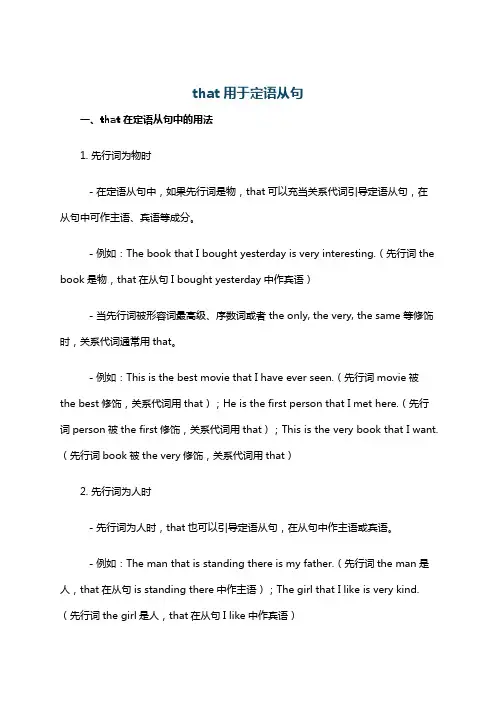
that用于定语从句一、that在定语从句中的用法1. 先行词为物时- 在定语从句中,如果先行词是物,that可以充当关系代词引导定语从句,在从句中可作主语、宾语等成分。
- 例如:The book that I bought yesterday is very interesting.(先行词the book是物,that在从句I bought yesterday中作宾语)- 当先行词被形容词最高级、序数词或者the only, the very, the same等修饰时,关系代词通常用that。
- 例如:This is the best movie that I have ever seen.(先行词movie被the best修饰,关系代词用that);He is the first person that I met here.(先行词person被the first修饰,关系代词用that);This is the very book that I want.(先行词book被the very修饰,关系代词用that)2. 先行词为人时- 先行词为人时,that也可以引导定语从句,在从句中作主语或宾语。
- 例如:The man that is standing there is my father.(先行词the man是人,that在从句is standing there中作主语);The girl that I like is very kind.(先行词the girl是人,that在从句I like中作宾语)- 当先行词既有人又有物时,关系代词只能用that。
- 例如:I can remember the persons and things that I saw in the village.(先行词persons and things既有“人”又有“物”,关系代词用that)3. that在从句中作宾语时的省略情况- 当that在定语从句中作宾语时,在口语和非正式文体中常常可以省略。
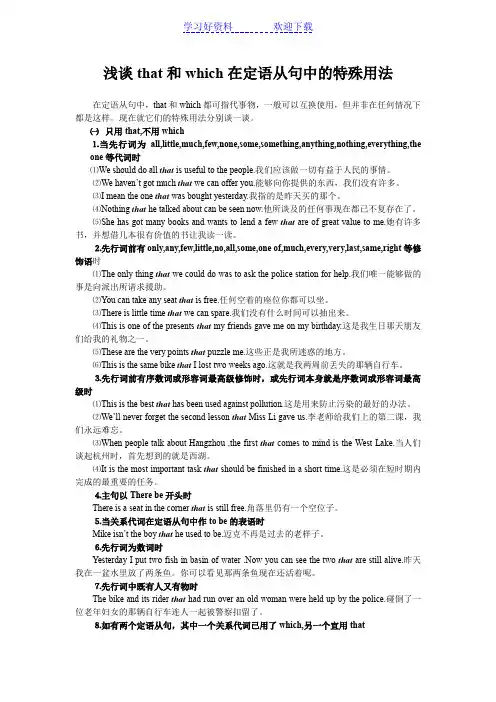
浅谈that和which在定语从句中的特殊用法在定语从句中,that和which都可指代事物,一般可以互换使用,但并非在任何情况下都是这样。
现在就它们的特殊用法分别谈一谈。
㈠只用that,不用which⒈当先行词为all,little,much,few,none,some,something,anything,nothing,everything,theone等代词时⑴We should do all that is useful to the people.我们应该做一切有益于人民的事情。
⑵We haven’t got much that we can offer you.能够向你提供的东西,我们没有许多。
⑶I mean the one that was bought yesterday.我指的是昨天买的那个。
⑷Nothing that he talked about can be seen now.他所谈及的任何事现在都已不复存在了。
⑸She has got many books and wants to lend a few that are of great value to me.她有许多书,并想借几本很有价值的书让我读一读。
⒉先行词前有only,any,few,little,no,all,some,one of,much,every,very,last,same,right等修饰语时⑴The only thing that we could do was to ask the police station for help.我们唯一能够做的事是向派出所请求援助。
⑵You can take any seat that is free.任何空着的座位你都可以坐。
⑶There is little time that we can spare.我们没有什么时间可以抽出来。
⑷This is one of the presents that my friends gave me on my birthday.这是我生日那天朋友们给我的礼物之一。
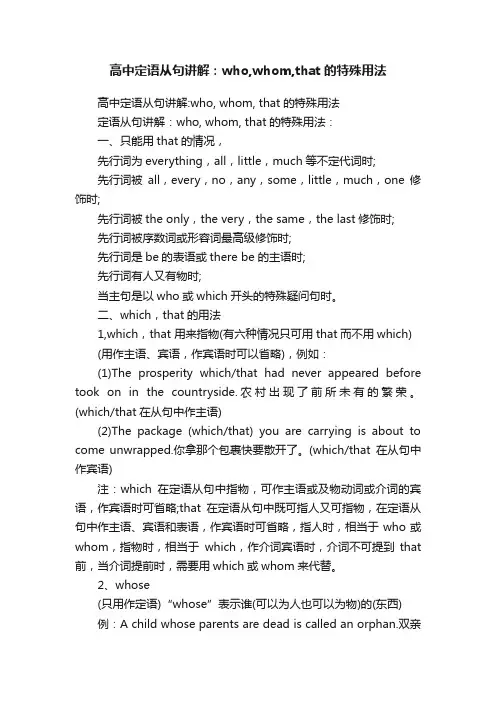
高中定语从句讲解:who,whom,that的特殊用法高中定语从句讲解:who, whom, that的特殊用法定语从句讲解:who, whom, that的特殊用法:一、只能用that的情况,先行词为everything,all,little,much等不定代词时;先行词被all,every,no,any,some,little,much,one修饰时;先行词被the only,the very,the same,the last修饰时;先行词被序数词或形容词最高级修饰时;先行词是be的表语或there be 的主语时;先行词有人又有物时;当主句是以who或which开头的特殊疑问句时。
二、which,that的用法1,which,that 用来指物(有六种情况只可用that而不用which) (用作主语、宾语,作宾语时可以省略),例如:(1)The prosperity which/that had never appeared before took on in the countryside.农村出现了前所未有的繁荣。
(which/that在从句中作主语)(2)The package (which/that) you are carrying is about to come unwrapped.你拿那个包裹快要散开了。
(which/that在从句中作宾语)注:which在定语从句中指物,可作主语或及物动词或介词的宾语,作宾语时可省略;that在定语从句中既可指人又可指物,在定语从句中作主语、宾语和表语,作宾语时可省略,指人时,相当于who或whom,指物时,相当于which,作介词宾语时,介词不可提到that 前,当介词提前时,需要用which或whom来代替。
2、whose(只用作定语)“whose”表示谁(可以为人也可以为物)的(东西)例:A child whose parents are dead is called an orphan.双亲都死了的孩子叫做孤儿。
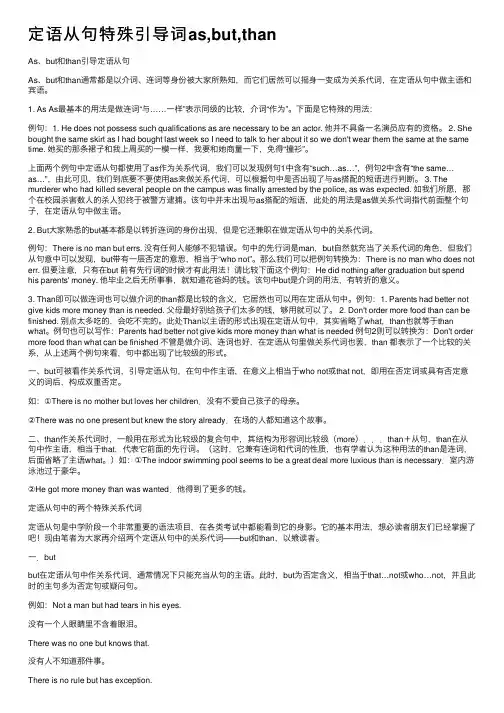
定语从句特殊引导词as,but,thanAs、but和than引导定语从句As、but和than通常都是以介词、连词等⾝份被⼤家所熟知,⽽它们居然可以摇⾝⼀变成为关系代词,在定语从句中做主语和宾语。
1. As As最基本的⽤法是做连词“与……⼀样”表⽰同级的⽐较,介词“作为”。
下⾯是它特殊的⽤法:例句:1. He does not possess such qualifications as are necessary to be an actor. 他并不具备⼀名演员应有的资格。
2. She bought the same skirt as I had bought last week so I need to talk to her about it so we don't wear them the same at the same time. 她买的那条裙⼦和我上周买的⼀模⼀样,我要和她商量⼀下,免得“撞衫”。
上⾯两个例句中定语从句都使⽤了as作为关系代词,我们可以发现例句1中含有“such…as…”,例句2中含有“the same…as…”,由此可见,我们到底要不要使⽤as来做关系代词,可以根据句中是否出现了与as搭配的短语进⾏判断。
3. The murderer who had killed several people on the campus was finally arrested by the police, as was expected. 如我们所愿,那个在校园杀害数⼈的杀⼈犯终于被警⽅逮捕。
该句中并未出现与as搭配的短语,此处的⽤法是as做关系代词指代前⾯整个句⼦,在定语从句中做主语。
2. But⼤家熟悉的but基本都是以转折连词的⾝份出现,但是它还兼职在做定语从句中的关系代词。
例句:There is no man but errs. 没有任何⼈能够不犯错误。
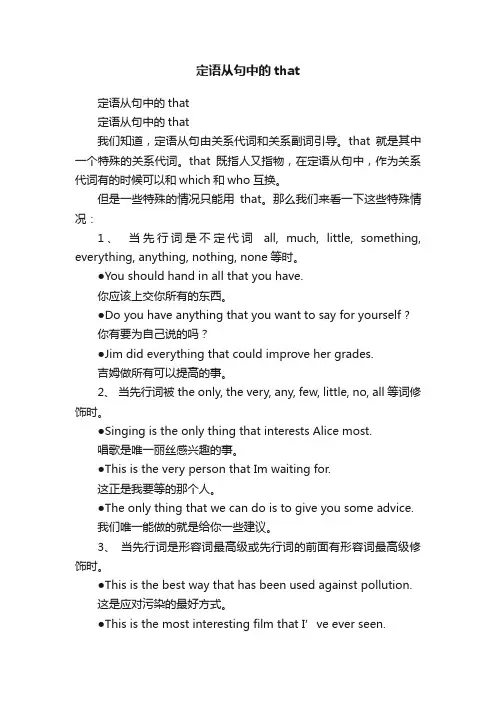
定语从句中的that定语从句中的that定语从句中的that我们知道,定语从句由关系代词和关系副词引导。
that就是其中一个特殊的关系代词。
that既指人又指物,在定语从句中,作为关系代词有的时候可以和which和who互换。
但是一些特殊的情况只能用that。
那么我们来看一下这些特殊情况:1、当先行词是不定代词all, much, little, something, everything, anything, nothing, none等时。
●You should hand in all that you have.你应该上交你所有的东西。
●Do you have anything that you want to say for yourself ?你有要为自己说的吗?●Jim did everything that could improve her grades.吉姆做所有可以提高的事。
2、当先行词被the only, the very, any, few, little, no, all等词修饰时。
●Singing is the only thing that interests Alice most.唱歌是唯一丽丝感兴趣的事。
●This is the very person that Im waiting for.这正是我要等的那个人。
●The only thing that we can do is to give you some advice.我们唯一能做的就是给你一些建议。
3、当先行词是形容词最高级或先行词的前面有形容词最高级修饰时。
●This is the best way that has been used against pollution.这是应对污染的最好方式。
●This is the most interesting film that I’ve ever seen.这是我看过的最有趣的电影。
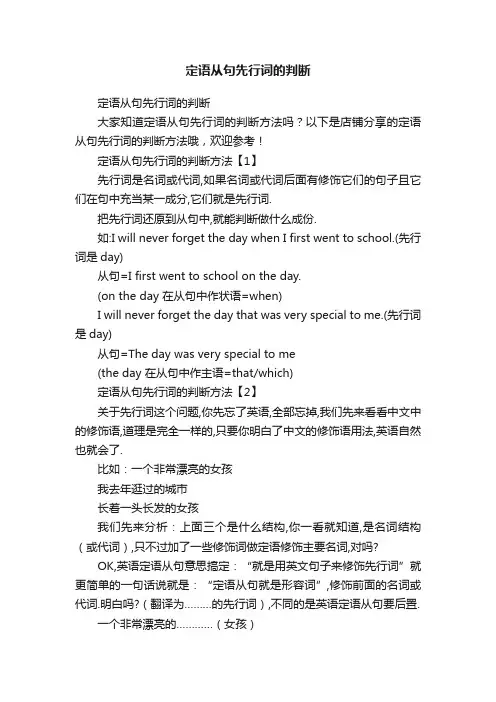
定语从句先行词的判断定语从句先行词的判断大家知道定语从句先行词的判断方法吗?以下是店铺分享的定语从句先行词的判断方法哦,欢迎参考!定语从句先行词的判断方法【1】先行词是名词或代词,如果名词或代词后面有修饰它们的句子且它们在句中充当某一成分,它们就是先行词.把先行词还原到从句中,就能判断做什么成份.如:I will never forget the day when I first went to school.(先行词是day)从句=I first went to school on the day.(on the day 在从句中作状语=when)I will never forget the day that was very special to me.(先行词是day)从句=The day was very special to me(the day 在从句中作主语=that/which)定语从句先行词的判断方法【2】关于先行词这个问题,你先忘了英语,全部忘掉,我们先来看看中文中的修饰语,道理是完全一样的,只要你明白了中文的修饰语用法,英语自然也就会了.比如:一个非常漂亮的女孩我去年逛过的城市长着一头长发的女孩我们先来分析:上面三个是什么结构,你一看就知道,是名词结构(或代词),只不过加了一些修饰词做定语修饰主要名词,对吗?OK,英语定语从句意思搞定:“就是用英文句子来修饰先行词”就更简单的一句话说就是:“定语从句就是形容词”,修饰前面的名词或代词.明白吗?(翻译为………的先行词),不同的是英语定语从句要后置.一个非常漂亮的…………(女孩)我去年逛过的…………(城市)长着一头长发的…………(女孩)OK翻译:Agirl(名词或代词)who is very beautiful(英语句子做修饰词相当于形容词)Agirl who is very beautifulThe city(名词) I visited last year=形容词The city I visited last yearA girl (名词)who has long hair.(形容词).A girl who has long hair好了,现在你不需要学习什么英语从句是代词还是副词,什么样的引导词等,现在只有一个理念你要明白,这非常重要,是框架,记住“定语从句就是形容词”紧跟先行词,一定翻译为…………的先行词,这是亘古不变的,打死印在脑海里!【拓展内容】定语从句先行词先行词是被定语从句所修饰的名词、代词。
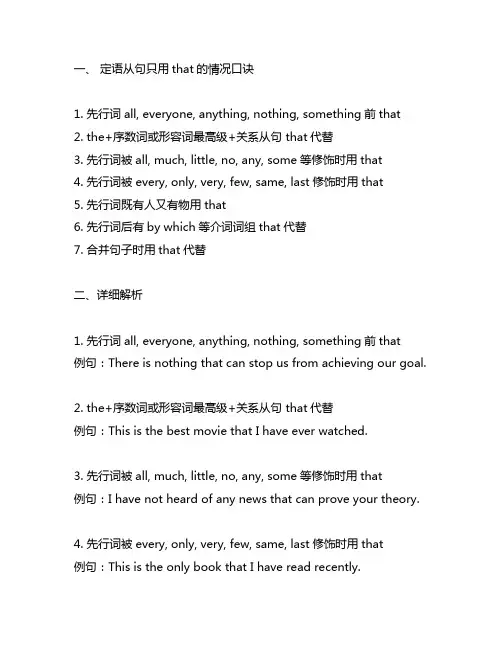
一、定语从句只用that的情况口诀1. 先行词all, everyone, anything, nothing, something前that2. the+序数词或形容词最高级+关系从句 that代替3. 先行词被all, much, little, no, any, some等修饰时用that4. 先行词被every, only, very, few, same, last修饰时用that5. 先行词既有人又有物用that6. 先行词后有by which等介词词组that代替7. 合并句子时用that代替二、详细解析1. 先行词all, everyone, anything, nothing, something前that例句:There is nothing that can stop us from achieving our goal.2. the+序数词或形容词最高级+关系从句 that代替例句:This is the best movie that I have ever watched.3. 先行词被all, much, little, no, any, some等修饰时用that例句:I have not heard of any news that can prove your theory.4. 先行词被every, only, very, few, same, last修饰时用that例句:This is the only book that I have read recently.5. 先行词既有人又有物用that例句:He is the only person that I trust in thispany.6. 先行词后有by which等介词词组that代替例句:He showed me the way that I could get to the 本人rport by the shortest path.7. 合并句子时用that代替例句:She told me that she wille to see me next week.以上便是定语从句中只用that的七种情况口诀,掌握了这七种情况,就能更加灵活地运用定语从句,使语言表达更加准确、地道。
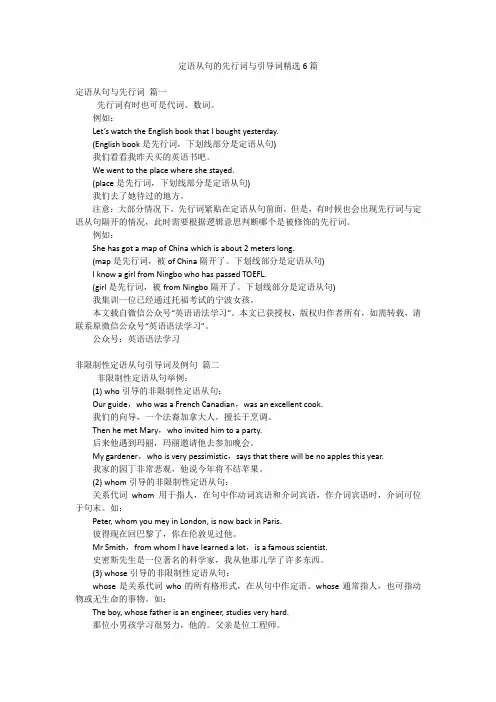
定语从句的先行词与引导词精选6篇定语从句与先行词篇一先行词有时也可是代词、数词。
例如:Let’s watch the English book that I bought yesterday.(English book是先行词,下划线部分是定语从句)我们看看我昨天买的英语书吧。
We went to the place where she stayed.(place是先行词,下划线部分是定语从句)我们去了她待过的地方。
注意:大部分情况下,先行词紧贴在定语从句前面,但是,有时候也会出现先行词与定语从句隔开的情况,此时需要根据逻辑意思判断哪个是被修饰的先行词。
例如:She has got a map of China which is about 2 meters long.(map是先行词,被of China隔开了。
下划线部分是定语从句)I know a girl from Ningbo who has passed TOEFL.(girl是先行词,被from Ningbo隔开了。
下划线部分是定语从句)我集训一位已经通过托福考试的宁波女孩。
本文载自微信公众号“英语语法学习”。
本文已获授权,版权归作者所有,如需转载,请联系原微信公众号“英语语法学习”。
公众号:英语语法学习非限制性定语从句引导词及例句篇二非限制性定语从句举例:(1) who引导的非限制性定语从句:Our guide,who was a French Canadian,was an excellent cook.我们的向导,一个法裔加拿大人,擅长于烹调。
Then he met Mary,who invited him to a party.后来他遇到玛丽,玛丽邀请他去参加晚会。
My gardener,who is very pessimistic,says that there will be no apples this year.我家的园丁非常悲观,他说今年将不结苹果。

英语定语从句的用法在英语中有很多种句式,今天让大家一起了解英语中定语从句的用法、接下来小编在这里给大家带来英语定语从句的用法,我们一起来看看吧!英语定语从句的用法定语从句由关系代词who、whom、whose、which、what、as 和关系副词where、when、why等引导,但须记住:1.what不能引导定语从句.2.关系词的分析须考虑它在定语从句中的成分。
一.指人的关系代词有who、whose、whom、that. 试分析:The old man who/whom /that we visited yesterday is a famous artist.Miss Wang is taking care of the child whose parents have gone to Beijing .The man with whom my father shook hands just now is our headmaster.(=The man who/whom that my father shook hands with just now is our headmaster.)注:A. 指人时有时只用who不宜用that。
1.先行词为one、ones或anyone(1)The comrade I want to learn from is the one who studies hard and works hard.(2)Anyone who breaks the law should be punished.2.先行词为these时These who are going to Beijing are the best students of our school.3.在there be 开头的句子中There is a student who wants to see you.4.一个句子中带有两个定语从句,其中一个定语从句的关系代词是that,另一个宜用who,以免重复。
定语从句中关系词的分类及特殊用法关系词的分类:定语从句中关系词的特殊用法:宾语从句:定语从句中的特殊用法定语从句是起定语作用的,修饰,说明名词,代词或句子内容的从句,被定语从句修饰的词叫做先行词。
引导定语从句,并在句中担任成分的词叫做关系代词或关系副词。
定语从句是高考常考内容之一,使用时要尤其注意以下十种特殊用法。
一、只用that不用which的情况1、当先行词是all, little, few, much, something, everything, anything, nothing, none等不定代词时。
如:Everything that happened then was like a nightmare.当时发生的一切就像是一场噩梦。
I will tell him all that you told me at the ball.我要把你在舞会上跟我说的话全都告诉他。
2、当先行词被only, any, few, little, no, all, just, very(恰好的,表示强调)等词修饰时。
例如:The only thing that we could do was to wait.我们能做的只是等待。
That’s the very thing that we can do.那正是我们能做的事。
3、当先行词是序数词、形容词最高级或先行词被序数词或形容词最高级修饰时。
例如:The first place that we visited was the Great Wall.我们参观的第一个地方是长城。
This is the best novel that I have ever read.这是我看过的最好的小说。
4、被修饰词为数词时。
例如:Yesterday I caught two fish and put them in a basin of water. Now you can see the two that are still alive. 昨天我捉到了两条鱼,把它们放在一盆水里。
that定语从句的用法及例子1. That 在定语从句中可以指代人或物呀。
就像“ The man that I met yesterday is very nice. ”(我昨天见到的那个男人很好。
),这里的 that 就指代了先行词 the man 呢。
2. 当先行词被一些特定词修饰时,也要用 that 呀。
比如说“ The only book that I have is very interesting. ”(我仅有的那本书非常有趣。
),这里有 the only 修饰,就得用 that 啦。
3. 有时候 that 可以在从句中作宾语呢。
像“ The bag that she bought is beautiful. ”(她买的那个包很漂亮。
),这里 that 就是指代 bag 作bought 的宾语哟。
4. 你知道吗,关系代词在从句中作主语时,一般不能省略 that 哦。
例如“ The man that is standing there is my father. ”(站在那里的那个男人是我的父亲。
),这个 that 就不能省呢。
5. 哎呀,还有一种情况,当先行词既有人又有物时,也得用 that 呢。
像“ The man and the dog that are in the garden are mine. ”(在花园里的那个男人和那只狗是我的。
)。
6. 还有还有,当先行词是不定代词时也是要用 that 的呀。
比如“ Something that is important should be remembered. ”(重要的一些事应该被记住。
)。
7. 最后呢,当先行词是序数词或形容词最高级时,还是要用 that 哦。
瞧,“ The first book that I read is very good. ”(我读的第一本书非常好。
)。
总之啊,that 定语从句的用法可多啦,大家要好好掌握呀!。
英语定语从句中的先行词,如何确定?先行词如何确定?一、看先行词如果先行词是人,用whom或者who,that 。
先行词是物用which 或者that。
如果先行词为时间用when,地点用where,原因用why。
Anyone who breaks the law will be punished.二、看成分看其后定语从句所缺何成分,先行词是人,且在定语从句中作为宾语,就用whom或者that ,口语中也可用who。
主语就用who或者that 。
The man (whom/who/that )I saw just now is Mr. Li.三、看完整性如果先行词是物,则用which或者that ,如果定语从句中主谓宾都不缺少,那么先行词在定语从句中一定是作为状语,时间名词就是时间状语,地点名词就是地点状语。
定语从句的关系副词是when、where、why。
1 关系副词when的用法。
when在从句中用作时间状语,其先行词须是表时间的名词。
如:We will put off the picnic until next week, when the weather may be better.我们打算把野餐推迟到下周,那时天气可能转好。
He came last night when I was out.他昨晚来时我出去了。
that有时亦可用作表时间的关系副词。
如:It happened on the day that I was born.那件事是在我出生的那一天发生的。
2、关系副词where的用法。
where在从句中用作地点状语,其先行词须是表地点的名词。
如:They went to the Royal Theatre, where they saw Ibsen's 'The Doll’s house'.他们去皇家剧院看了易卜生的《傀儡家庭》。
The place where Macbeth met the witches was a desolate heath.麦克白遇见女巫的地方是一片荒原。
定语从句the one先行词用法
the one是用作形容词性物主代词,是一个指示代词,常用来在句子中表示与其它事
物之间的某一次分离或另一个情形。
它多指正确的、好的、有价值的或最重要的一个,作
状语从句或定语从句的先行词,以引导限制性定语从句,修饰某个名词。
如:
We should choose the one that is most suitable for us.
我们应该选择最适合我们的一个。
他正在寻找他能信任的那个人。
I prefer the one with longer life
我更喜欢那个使用寿命更长的。
the one在句中作限定语,在句中指不能和其他东西相混淆,唯一究竟要选择的事物,是独一无二的,用来限定宾语,强调‘特别某一个’。
the one 后应跟随一个定语从句,
就特定的人或事物进行定义,强调和其他人或事物的区别,它也可以用作形容词,来表示
‘那个’,而不是其他的。
如:
他拿走了一朵玫瑰而将其余的放回去了。
红的是我的,黑的是你的。
今天,我穿的是新的那一件。
他读了在他眼前的这个句子。
定语从句先行词特殊用法考查
[标签:来源]
定语从句是高中英语教学的重点、难点,又是高考考查的热点。仔
细研究近年各地高考试题,不难发现命题者往往借助于定语从句先行词
的特殊用法,巧妙考查考生在特定语境中对定语从句关系词的选择。现
举数例分析如下: 1.(2006山东)We’re just trying to reach
a point______both sides will sit down together and talk.
A. where B. that C. when D. which 【解析】答案为A。本题的
先行词是point,此处表示抽象地点且在定语从句中作地点状语,因此
应填where。如果考生只知道point表示“点、分数”,不熟悉其可以
表示抽象地点,极易造成误选。 2.(2005上海)If a shop has
chairs_________women can park their men, women will spend more
time in the shop. A. that B. which C. when D. where
【解析】本题的先行词并不是我们常见的表示地点的名词(如place,
room, house, street, area),而是chairs。命题者正是通过这一点
迷惑考生,使考生误选that或which。本题的句意是:“商店如果有
椅子,女士们可以让男士们坐在椅子上”,即women can park their
men in/on the chairs,所选关系词在定语从句中应该作地点状语,故
选D。 3.(2004湖南)I work in a business______almost
everyone is waiting for a great chance. A. how B. which C.
where D. that 【解析】先行词是表地点的a business(商业机
构,公司),从句中的谓语动词is waiting for后有宾语a great
chance,所以需要填where或in which,故选C。 4.(2003上
海)I can think of many cases_______students obviously knew a
lot of English words and expressions but couldn’t write a
good essay. A. why B. which C. as D. where 【解析】本
题中的先行词是表示抽象地点的cases(实例,情况),定语从句中不
缺主语或宾语,用关系副词where或in which,故选D。 5.(2003
北京春季)We are living in an age______many things are done on
computer. A. which B. that C. whose D. when 【解析】本
题的先行词是an age,表示“时代、年代”,从句是被动语态,句子
结构是完整的,故选D。 6.(2005广东)Many people who had
seen the film were afraid to go to the forest when they
remembered the scenes_________people were eaten by the tiger.
A. in whichB. by whichC. whichD. that 【解析】本题的先行词
是scenes,表示“场景”的意思。句意为“在那些场景中,人被老虎
吃掉”,即in the scenes people were eaten by the tiger,故选
A。 7.(2004全国II)There were dirty marks on her
trousersshe had wiped her hands. A. where B. which C. when
D. that 【解析】答案为A。本题的先行词是trousers,从句缺少
状语,不缺主语和宾语,所以用关系副词引导定语从句。句意为“在她
擦手的裤子上有污迹”。 8.(2001上海)He has got himself
into a dangerous situationhe is likely to lose control over
the plane. A. where B. which C. while D. why 【解析】
答案为A。本题的先行词为situation,意为“境况”,从句中不缺主
语或宾语,用关系副词where引导定语从句。句意为“他陷入飞机很可
能失去控制的危险境地”。 由此可见,考生做这类单选试题时应
该注意的是:表面上备选项都有that或which,但实际上都要填
where, when或介词 + which,这类先行词相对比较固定,常见的有
point, case, age, business, occasion,situation, chair等。
200803/6196.html
【发表评论】【